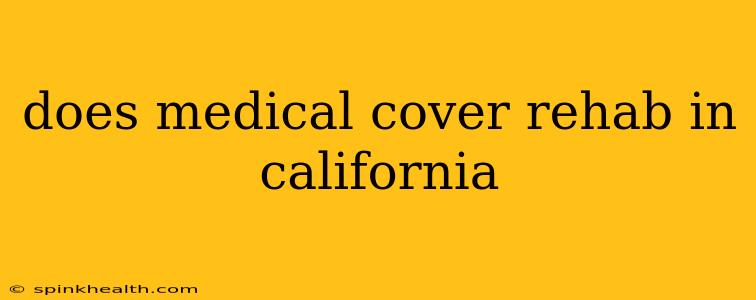Does Medical Cover Rehab in California? Navigating the Maze of Insurance and Addiction Treatment
The question, "Does medical cover rehab in California?" is a crucial one for anyone facing addiction or seeking help for a loved one. The answer, unfortunately, isn't a simple yes or no. It's a complex journey through insurance policies, treatment options, and California's specific regulations. Let's unravel the intricacies together.
Imagine this: Sarah, a young professional in San Francisco, is struggling with opioid addiction. She knows she needs help, but the cost of rehab feels insurmountable. Her first thought? Will my insurance cover it? This is a question shared by countless Californians.
Understanding California's Healthcare Landscape
California, like many states, has a complex healthcare system. The extent of coverage for substance abuse treatment depends heavily on several factors:
-
Type of Insurance: Your insurance provider (Kaiser Permanente, Blue Shield, Anthem, etc.) plays a massive role. Each plan has its own network of providers, specific benefits, and coverage limitations. Some plans offer comprehensive coverage for inpatient and outpatient rehab, while others may only cover a limited number of days or specific types of treatment.
-
Policy Details: Your individual policy dictates what’s covered. Carefully review your policy documents, especially the section on "mental health and substance abuse" benefits. Pay close attention to:
- Pre-authorization requirements: Many plans require pre-authorization before treatment begins. Failure to obtain this authorization could leave you with substantial out-of-pocket costs.
- In-network vs. out-of-network providers: Choosing an in-network provider typically results in lower costs and streamlined billing.
-
Type of Treatment: The specific type of rehab you need (inpatient, outpatient, detox) will influence coverage. Inpatient rehab, which involves a stay at a residential facility, usually costs more than outpatient programs. Detoxification, the initial process of medically managing withdrawal symptoms, may have separate coverage stipulations.
-
Level of Care: Your treatment needs will be assessed by a professional, determining the appropriate level of care (e.g., medically managed detox, intensive outpatient, residential). Your insurance company will often review this assessment to determine coverage.
What are the common types of insurance coverage in California?
California offers various insurance options; this includes:
- Employer-sponsored plans: Many employers offer health insurance as part of their benefits package.
- Individual plans: purchased through the Covered California marketplace.
- Medi-Cal: California's Medicaid program.
- Medicare: for those 65 or older or individuals with certain disabilities.
Does Medi-Cal cover rehab in California?
Medi-Cal, California's Medicaid program, does cover substance use disorder treatment, but the specifics depend on the individual's eligibility and the treatment plan. It is vital to contact Medi-Cal directly to understand eligibility and the extent of the coverage under the plan.
What if my insurance doesn't fully cover rehab?
If your insurance doesn't cover the full cost of rehab, several options exist:
- Negotiate with the provider: Many rehab facilities are willing to work with insurance companies to reduce costs.
- Explore payment plans: Some facilities offer payment plans to make treatment more affordable.
- Seek financial assistance: Organizations like the Substance Abuse and Mental Health Services Administration (SAMHSA) offer resources and financial assistance for addiction treatment.
The Path to Recovery: Taking the First Step
Navigating the world of insurance and addiction treatment can feel overwhelming. However, remember that seeking help is a critical first step. Don't let the fear of financial burden prevent you from getting the treatment you need. Start by:
- Contacting your insurance provider: Understand your policy's specifics regarding substance abuse treatment.
- Reaching out to rehab facilities: Inquire about their insurance policies and financial assistance options.
- Seeking guidance from addiction specialists or social workers: They can help you navigate the complexities of insurance and access resources to support you in your journey to recovery.
Recovery is possible, and support is available. Don't hesitate to reach out for help. Your health and well-being are worth it.

